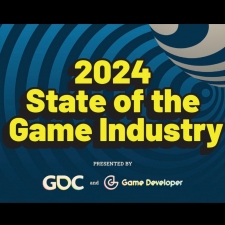In advance of the 2024 Game Developers Conference, the show's organizers have once more surveyed more than 3,000 game developers to shed light on current and future game industry trends.
And the results aren't pretty.
Topline woes include the fact that four out of five developers have ethical concerns about Generative AI. That's not just worries about whether they're about to be usurped by an algorithm, but actual ethical concerns about when, where and whether AI should be used at all.
Worries about being out of a job are covered off as a completely different issue with an all-time high of 56% of the developers polled now worried about future layoffs. While, in an apparent attempt to fight back, or at least have their voices heard and action taken, the report notes that younger developers are now 157% more likely than older devs to support unionization.
A tough past 12 months
"To say it’s been a tough year for game developers would be an understatement," says Alissa McAloon, Publisher at Game Developer. "Developers have faced adversity and uncertainty at every turn, as technology shakeups and workplace instability continue to shift the wider industry landscape. In precarious times like these, the perspectives and experiences captured within the 2024 State of the Game Industry report become more valuable than ever."
"Within this year’s survey, you’ll find data and commentary on how developers are weathering the issues directly impacting their lives. Key issues like: divisive return-to-office policies, ongoing waves of layoffs, the impact of sweeping studio acquisitions, shifts in the unionization landscape, ethical concerns about generative AI, and the ever present issue of crunch."
AI and more
On the topic of AI, at present, tools are most prevalent in the fields of Business & Finance (44%), Community/Marketing/PR (41%) and Production & Team Management (33%).
Only 25% of devs were using AI for Programming/Engineering, 21% for Game Design and 13% for Narrative/Writing.
When asked "What applications of Generative AI would you like to see in the future" responses lay on the side of cautious optimism at best.
“I’d like to see AI tools that help with the current workflows and empower individual artists with their own work. What I don’t want to see is a conglomerate of artists being enveloped in an AI that just does 99% of the work a creative is supposed to do," wrote one respondent. "None. AI exploits the work of others without credit or payment and is a net loss to true creativity," wrote another.
"Management will seriously think that they can replace artists or pay artists less for their work. They are already doing questionable things while the tech is still being developed. I expect artists to be laid off in full once the tech becomes proven," wrote one respondent.
Overall 57% of those polled thought that generative AI would have a "mixed impact", with 21% opting for "positive impact" and 18% going for "negative impact". On the issue of "how concerned are you" the result scored a dead heat for top answers "very concerned" and "somewhat concerned" both scoring 42% of the vote.
"Developers working in business, marketing, and programming were more likely to say the technology would have a positive impact. Those in narrative, visual arts, and quality assurance were more likely to say the impact would be negative," observes the report.
Who's making what?
Other less concerning finds reveal that the top engine for game development is directly tied this year, with 33% of devs polled using Unity and 33% using Unreal. Interestingly 7% of devs said that they'd switched platforms this year while 28% said they'd considered switching in light of 2023's Unity runtime woes.
"When asked to explain their reasons for possibly switching game engines, many developers cited Unity’s policies as their main motivator. According to an analysis of open responses conducted by our partners at Omdia, 51% said they were interested in switching specifically to Godot, either from Unity or Unreal Engine," writes the report.
The top platform being developed for being PC, with 66% of the vote with Android (24%) and iOS (23%) coming in fourth and fifth.
Interestingly the top business model being used is in the production of a "digital premium game" at 51% with "free to download" coming second at 32%. While one area in which the devs neatly made their position more clear is the area of blockchain tech (incorporating crypto, NFTs and Web3). 77% of respondents said they were "not interested" in anything to do with it.
More optimistically the rise in TV adaptations from games has been wholeheartedly embraced with 63% of devs agreeing that such spin-offs have been "good for the games industry"
“It’s a natural progression. The people who grew up with games more in their childhood are now in positions of power within these companies and are able to pull the right strings and bring the franchises they love to more audiences. Cross-pollination of media where it works for the franchise can only be a good thing - especially now that a lot more care goes into these adaptations to be faithful while also leveraging the strengths of new media," wrote one respondent.
And… "After years of being told that games are not cool I honestly feel like we’re owed an apology now.”
Working conditions
And of course the knotty issue of 'crunch' came up. Top choice for "average number of hours being worked per week" came out at 36-40 hours per week, an option chosen by 33% of respondents.
Meanwhile for the issue of layoffs and potential layoffs things were more worrisome. While 35% of respondents said that they were “not at all concerned”, the majority at 56% expressed some degree of consent that they could face being laid off in the next 12 months.
It’s a situation perhaps best summed up by one respondent who wrote, “Studios grew too quickly during the pandemic and people are spending less money on games during a cost-of-living crisis. The bubble is sadly bursting. I hope it creates new start-ups that revolutionize how we develop games and sets a precedent for larger studios to follow.”
And another who said, “We need more new companies, not a few big ones.”
And what do they plan to do to safeguard their roles? In this year's survey 57% of developers are in favour of unionization, up from 53% the year before. Of that number 72% of respondents were in the lowest age bracket, 18-24.
To get your copy of the full report head here.





















